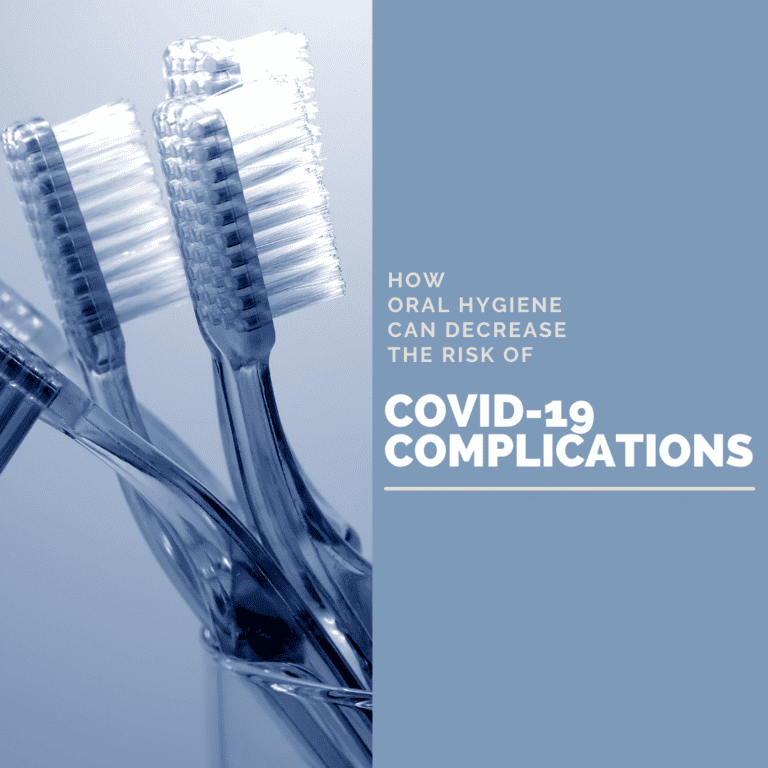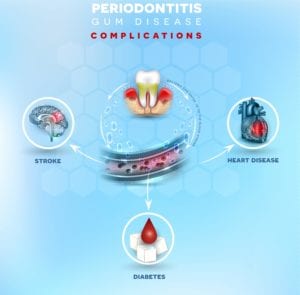How Oral Hygiene Can Decrease the Risk of COVID-19 Complications

Did you know that proper dental care can help decrease the severity of COVID-19 infections? While this may seem far-fetched considering the fact that COVID-19 is a respiratory virus, recent research has actually found a possible link between poor oral hygiene and severe COVID-19 infections. In fact, an article published on the National Center for Biotechnology Information database entitled, “Could there be a link between oral hygiene and the severity of SARS-CoV-2 infections” explores this connection between oral hygiene and COVID-19 infections.

Before looking into the specifics of the article, it is important to first understand the link between oral and overall health. For starters, your oral health can, in fact, affect your overall health. This is because the mouth contains a variety of bacteria. While some types of bacteria are beneficial, other types of bacteria are detrimental and can cause tooth decay and gum disease. When harmful bacteria build up in the mouth, they can eventually overwhelm the mouth’s natural defenses and pass into the bloodstream.
Once inside the bloodstream, these bacteria can travel through the body and cause a range of overall health problems such as: pneumonia, heart attack, stroke, diabetes, endocarditis, respiratory problems, clogged arteries, hypertension, or pregnancy complications. The article states that, “patients with periodontal disease are at a 25% increased risk of cardiovascular disease, triple the risk of diabetes mellitus, and a 20% increased risk of hypertension”. While these health problems can occur simply as a result of poor oral hygiene, they can also occur simultaneously with a COVID-19 infection, which increases the risk of developing COVID-19 complications.
In fact, the article references the 1918 influenza pandemic to note that many patients with severe cases of the virus were also affected by bacterial superinfections. Currently, research cited in the article found that 50% of patients who died from COVID-19 had secondary bacterial infections, while around 80% of COVID-19 patients in the ICU also showed excess amounts of bacteria in addition to the virus. It is important to also note that comorbidities for COVID-19 like diabetes, hypertension, and heart disease are associated with increased levels of oral bacteria.

While the exact mechanism of the relation between oral bacteria and COVID-19 severity is still being examined, researchers believe that it has something to do with the possible aspiration of oral secretions filled with bacteria. This allows the bacteria to be inhaled into the lungs, where it can cause or worsen complications of COVID-19 like pneumonia or sepsis. Researchers note, “…inadequate oral hygiene can increase the risk of inter-bacterial exchanges between the lungs and the mouth, increasing the risk of respiratory infections and potentially post-viral complications”.
Luckily, you may be able to decrease the risk of developing COVID-19 complications by simply practicing proper oral hygiene. Brushing your teeth twice a day for two minutes at a time and flossing daily removes plaque and bacteria from the surface of your teeth in order to keep bacteria levels from overwhelming your mouth’s natural defenses. Additionally, it is important to visit your dentist for professional teeth cleanings at least every six months, maybe more in some cases. Regular dental cleanings ensure that plaque, bacteria, and tartar are removed from the entire surface of your teeth, even the hardest to reach places. Not only will this protect you against tooth decay and gum disease, but it may even prevent COVID-19 complications.






Recent Comments